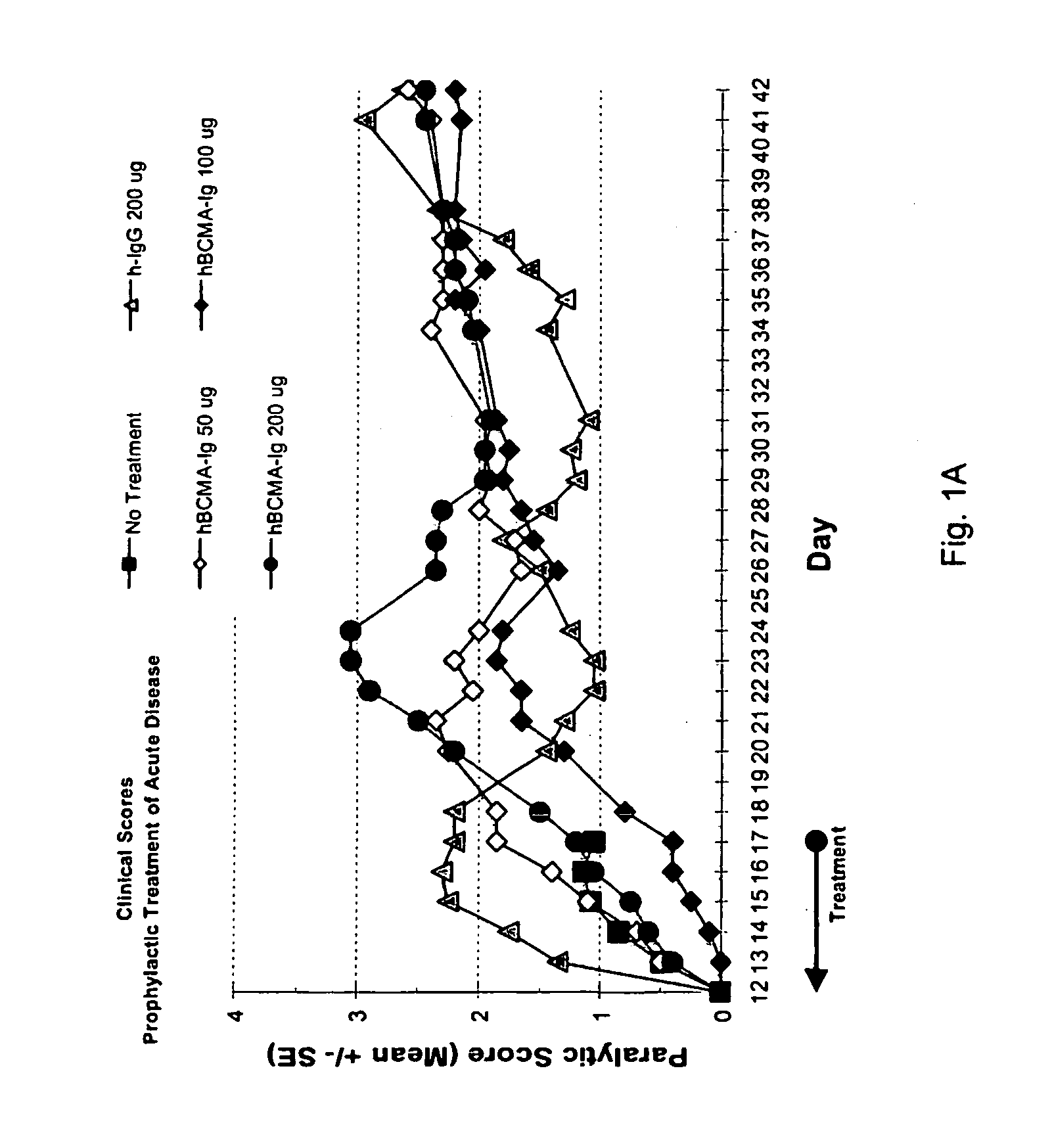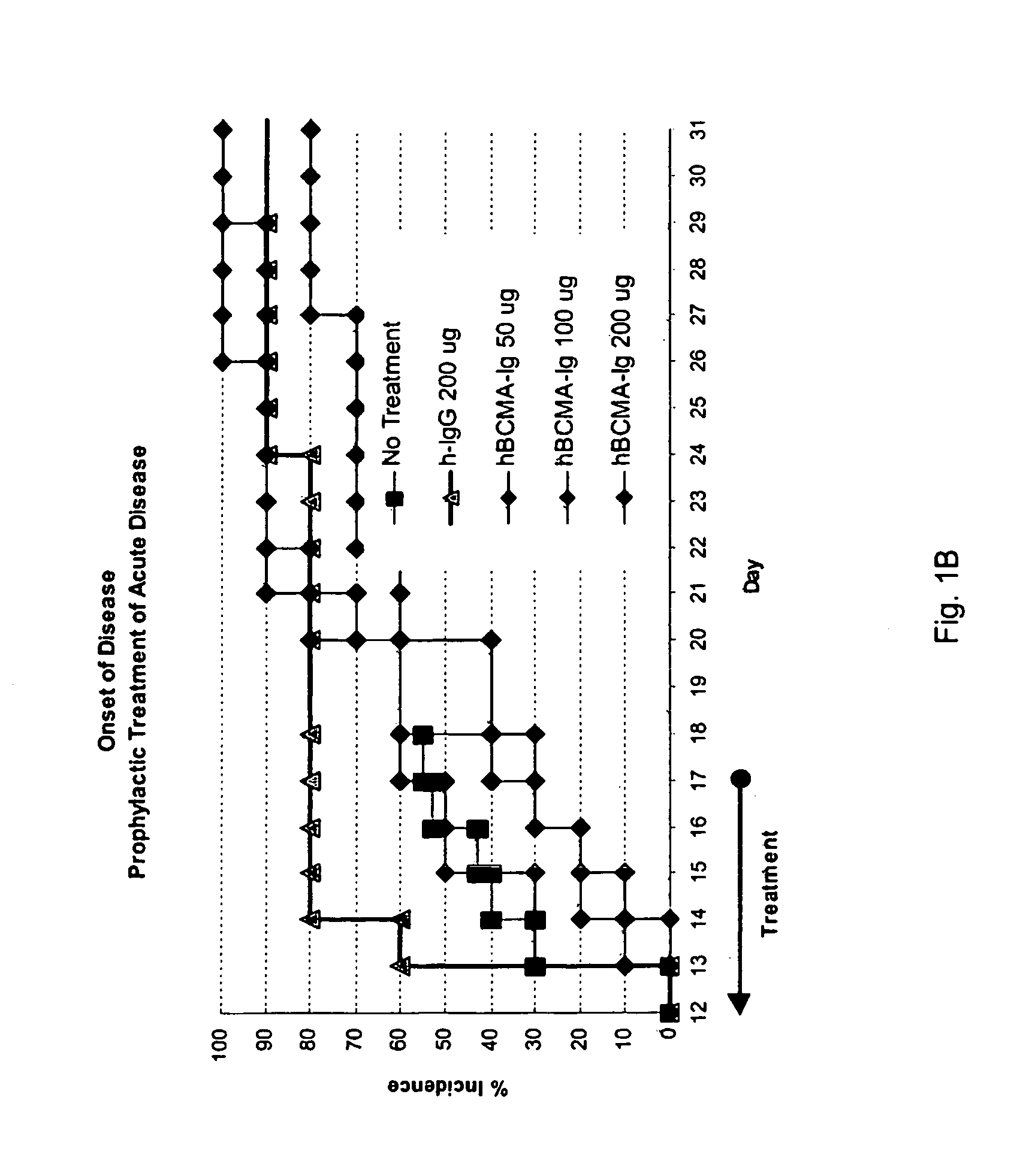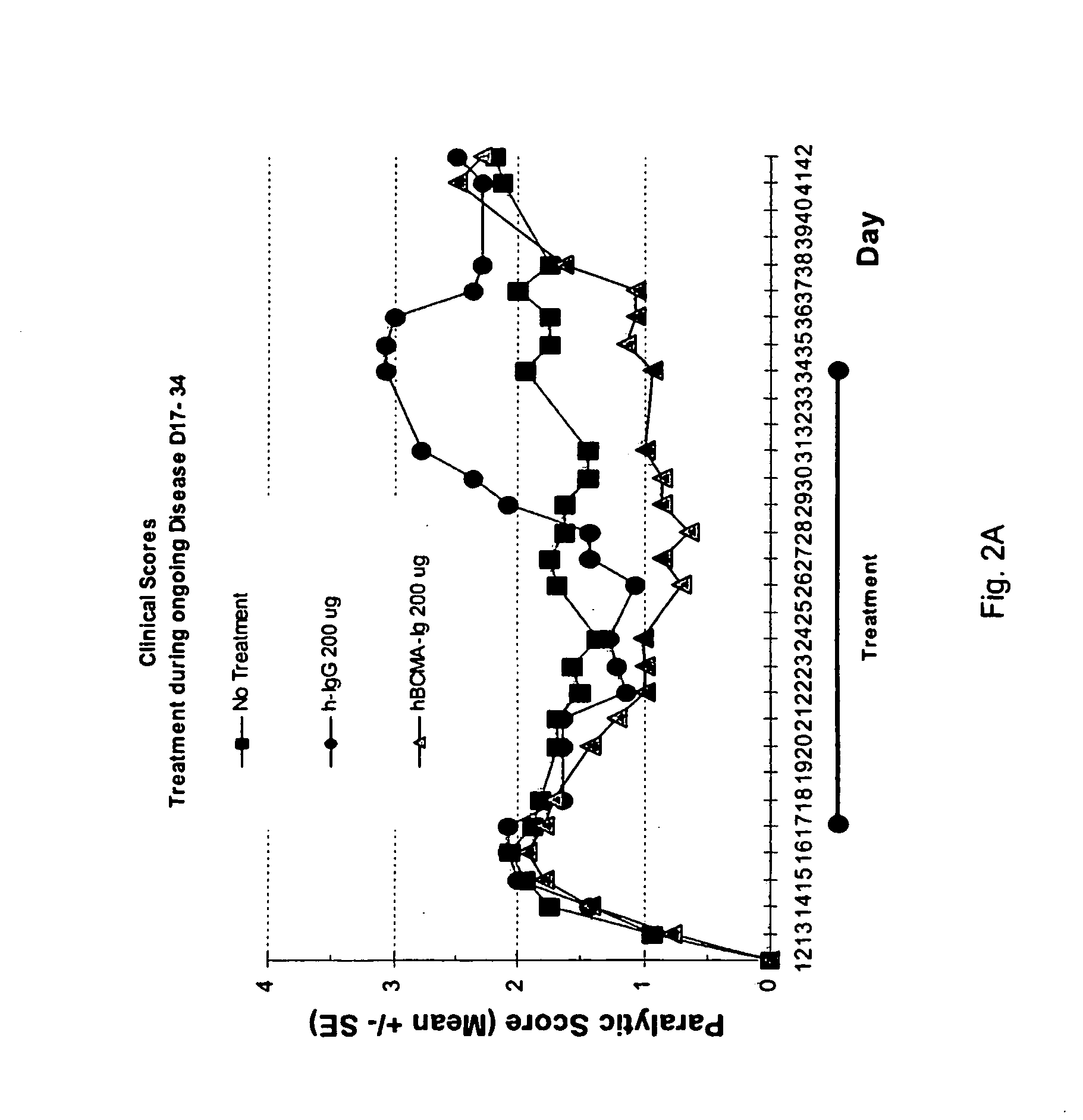Use of Bcma as an Immunoregulatory Agent
a technology of immunoregulatory agent and bcma, which is applied in the field of immunoregulatory agent bcma, can solve the problems of no one being able to reverse the progression of disease, and increasing permanent deficit, so as to reduce the risk of occurrence of neurodegenerative autoimmune disorders, delay the onset of acute disease, and reduce the severity
- Summary
- Abstract
- Description
- Claims
- Application Information
AI Technical Summary
Benefits of technology
Problems solved by technology
Method used
Image
Examples
example 1
Treatment of PLP-Induced EAE with BCMA-Fc
[0082]Prophylactic efficacy and dose response for BCMA-Fc were evaluated in a PLP-induced mouse EAE model as follows. 80 female 8 weeks old SJL mice purchased from Jackson Laboratory (Bar Harbor, Me.) were randomly assigned to eight groups of ten. Animals were housed 5 animals per cage in specially designed cage rack systems providing approximately 40 air changes per hour. Food and water were provided ad libitum.
[0083]EAE was induced in the mice as follows. On day 0, mice were injected subcutaneously (into each rear flank and near the dorsal midline) altogether with 80 μg bovine proteolipid protein (PLP) peptide 139-151, 200 μg Mycobacterium tuberculosis H37 RA (Difco Laboratories, Detroit, Mich., Cat. No. 3114-33-8) in 100 μl of incomplete Freund's adjuvant (ICFA) (Difco Laboratories, Cat. No. 0639-60-6).
[0084]Beginning day 1 and through day 17, four groups of animals were injected IP with 200 μg of nonspecific polyclonal human IgG (Novartis...
example 2
Treatment MOG-Induced EAE with BCMA-Fc
[0088]Therapeutic efficacy of prophylactic treatment or during ongoing disease and dose response for BCMA-Fc were evaluated in a MOG-induced mouse EAE model as follows.
[0089]The extracellular domain of human myelin oligodendrocyte glycoprotein (MOG) (amino acid residues 1-121 of the mature protein) (rMOG) was produced in E. coli using the pQE9 expression vector (Qiagen, Australia) to incorporate an amino terminal histidine tag. rMOG was loaded onto a Ni-NTA Superflow (Qiagen, Australia) under denaturing conditions (8M urea) as per the manufacturer's instructions using a BioLogic LP Chromatography System (Bio-Rad Laboratories, Australia). The bound protein was washed with isopropanol to remove endotoxin, refolded on the column, eluted, and dialyzed against 50 mM NaCl in 10 mM Tris pH 8. Protein concentration and purity were estimated using a Micro BCA assay (Bio-Rad Laboratories, Australia) and SDS-PAGE, respectively. Endotoxin levels were determ...
example 3
Effect of BCMA-Fc Treatment on Autoantibody Titers
[0091]Serum anti-MOG titer and isotype concentrations were determined by ELISA. 96-well microtiter plates were coated with rMOG (5 μg / ml), blocked, washed and incubated with test sera. Total Ig and isotypes bound were detected using Horse Radish Peroxidase (HRP)-coupled anti-Ig, IgG1, IgG2c, IgG2b, IgG3, and IgM (Southern Biotechnology Associates, Inc., Birmingham, Ala.). Color was developed with ABTS (Sigma Aldrich, Australia) (450 ng / ml) and the optical density measured at 405 nm (OD405) using a microplate reader (Molecular Devices, Sunnyvale, Calif.).
[0092]FIG. 3 shows titration of rMOG-specific IgG activity in NOD / Lt mice treated with BCMA-Fc, IgG, or PBS. Results at each dilution have been adjusted (subtraction of nonspecific binding) and represent mean comparable binding of each group ±SEM. The mean titer SEM for NOD / Lt mice was defined as the sera dilution giving an OD492 three times higher than that of background.
[0093]FIG. 4...
PUM
| Property | Measurement | Unit |
|---|---|---|
| pH | aaaaa | aaaaa |
| pH | aaaaa | aaaaa |
| pH | aaaaa | aaaaa |
Abstract
Description
Claims
Application Information
 Login to View More
Login to View More - R&D
- Intellectual Property
- Life Sciences
- Materials
- Tech Scout
- Unparalleled Data Quality
- Higher Quality Content
- 60% Fewer Hallucinations
Browse by: Latest US Patents, China's latest patents, Technical Efficacy Thesaurus, Application Domain, Technology Topic, Popular Technical Reports.
© 2025 PatSnap. All rights reserved.Legal|Privacy policy|Modern Slavery Act Transparency Statement|Sitemap|About US| Contact US: help@patsnap.com



